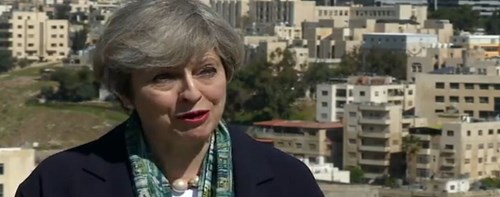Who would have thought a story about chocolate eggs could generate so many headlines and so much social media traffic?
If you missed it, the National Trust and Cadbury were on the receiving end of some pretty strongly worded criticism yesterday for renaming an event previously known as the Easter Egg Trail as Cadbury Egg Hunt.
The Church of England accused them of ‘airbrushing faith’, while the Prime Minister later called the decision to ‘drop’ the word ‘Easter’ as ‘absolutely ridiculous’.
And it was Theresa May’s comments which really stole the media attention.
Looking through the social media reaction yesterday, a lot of people wondered why the Prime Minister had found the time to discuss this issue when there are arguably more important topics demanding her attention.
Well, I’m going to stick my neck out and say these comments were not supposed to be the main message of her interview with ITV News (click on the picture below to see the clip).
And it seems highly unlikely to me that the focus for a reporter about to question the Prime Minister on a post-Brexit trade push in Saudi Araba would be on an argument about an Easter egg hunt back home.
What is far more probable is that she was asked for her views towards the end of the interview as a ‘while you are here’ or ‘and finally’ style question, particularly in light of the comments from the Church of England.
And not for the first time, it was the response to this tricky style of interview question which stole the headlines:
Theresa May attacks ‘ridiculous’ National Trust over ‘airbrushing of Easter Daily Telegraph
Theresa May condemns National Trust for axing ‘Easter’ from egg hunt The Guardian
Theresa May criticises Cadbury over Easter egg hunt BBC News
The Prime Minister’s comments could easily have caused a media crisis for both the National Trust and Cadbury and undoubtedly their press offices and social media managers will have been busy.
But from the tone of the coverage, it seems the story has actually caused more embarrassment to the Prime Minister, with The Mirror, for example, running a story on ‘9 things Theresa May was less outraged about than Easter Eggs’.
The only things airbrushed out of the Cadbury's & National Trust story are truth, accuracy and common sense.https://t.co/CQ62fkGAk5 pic.twitter.com/9UxL6EC6B2
— Paul Wiltshire (@Paulwiltshire) April 4, 2017
Theresa May condemning the National Trust over an untrue Easter "ban" story before sucking up to Saudi head choppers is pure The Thick of It — Kevin Maguire (@Kevin_Maguire) April 4, 2017
If the National Trust has airbrushed Easter, why is this on its home page? pic.twitter.com/Njlqw1KEjX
— Cumbria Journo (@EllisButcher) April 4, 2017
It is hard to escape the thought she has intervened in a story she knew little about because the briefest of searches would have shown that while the word ‘Easter’ may not appear in the logo for the hunt , there are plenty of references to it on the organisations’ websites and promotional material. The events page on the National Trust’s website contains 19 ‘Easter’ mentions alone, while the Cadbury website promoting the event includes the word 14 times.
Not so much ‘fake news’ as ‘Flake news’. (I’ll get my coat)
But this is the danger of the ‘while you are here’ question - the reporter is taking the interviewee away from the main subject of the interview to one they are likely to be less certain about. And in this case the response appears to have been, well, scrambled. (Ed – yes, please do get your coat!)
On our media training courses we always stress the importance of anticipating the wider media topics. When you are the Prime Minster there is admittedly going to be quite a lot of potential material but other spokespeople should be able to narrow this down considerably.
The key when these issues are raised in interview is to answer the question without saying something which is going to take focus away from what you want to talk about.
Look to a provide a short answer before using media training techniques like bridging to get back to the main message.
The Prime Minister is not the first person to be left with egg on her face from a ‘while you are here’ question and she probably won’t be the last, but it is a trap which can easily be avoided.
Media First are media and communications training specialists with over 30 years of experience. We have a team of trainers, each with decades of experience working as journalists, presenters, communications coaches and media trainers.
Click here to find out more about our journalist led media training and social media training.
Subscribe here to be among the first to receive our blogs.



